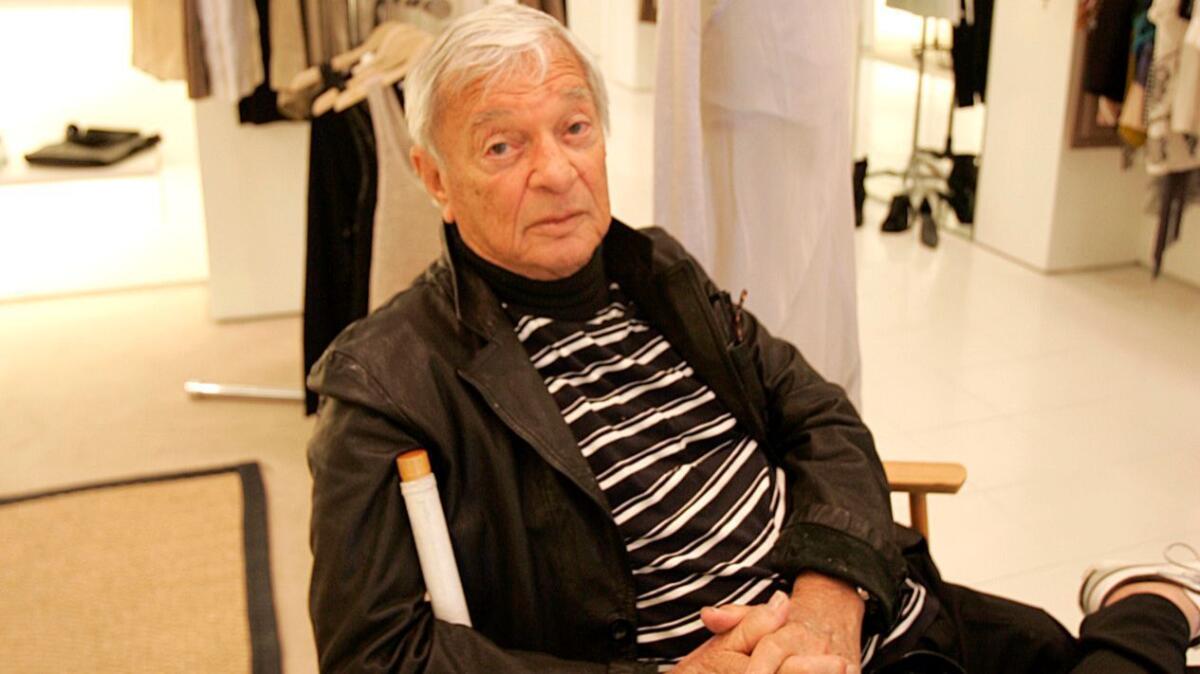Herbert Fink, hipster who helped make Rodeo Drive a fashion destination, dies at 93
- Share via
When Herbert Fink set up shop on Rodeo Drive, it was an unremarkable side street dotted with filling stations, a hardware shop, a few old bungalows and an aging Brown Derby restaurant.
He stocked his tables with labels that were foreign to many in the city — Dolce & Gabbana, Issey Miyake, Sonia Rykiel — and piled vibrant T-shirts, scarves and tops on the shelves until they spilled out like candy.
His retail neighbors were Fred Hayman, Dick Caroll and Jerry Magnin, and together their impossibly hip boutiques formed the bedrock of what would become one of America’s great fashion destinations.
Fink, whose family closed the last of his Theodore boutiques two years ago, died Feb. 18 at his home in Bel-Air. He was 93.
By 1990, there were nine Theodore boutiques in Southern California, stretching from Woodland Hills to Newport Beach. But the shop on Rodeo remained the flagship until Fink — just like the other independent boutique owners before him — realized he had helped make the street so desirable that only retailers with the deepest corporate pockets could afford the sky-high rents.
So in 2008, Fink packed up and moved the boutique a few blocks south.
“It’s all Pucci-Gucci. It got too expensive,” he told The Times in 2008. “It’s too corporate.”
Born April 21, 1923, in Los Angeles, Fink grew up in the Crenshaw district. His father ran a string of shops that sold low-cost women’s clothing and by the time he was 13, Fink went to work at one of the stores, though his adolescent career fizzled quickly when he tried to help form a union to push for higher pay.
“My father picked me up by the seat of my pants and threw me out in the alley and told me never to come back again,” Fink recalled during a 2004 interview with Los Angeles Magazine.

Fink’s fashion epiphany didn’t arrive until years later when he was in Saint-Tropez on a buying mission for a shop he ran in Reseda, Country Club Fashions. Sitting at a cafe, he watched as people lounged on a yacht moored offshore and then followed some of them when they came ashore, wandering in and out of the boutiques.
“They threw T-shirts over their arms, boom, boom, boom,” he said of one group of women he had tailed. “I thought, ‘I’m going into the T-shirt business.’ ”
With his wife, Norma, he opened Theodore in 1969, doing his utmost to make the shop resemble the yacht he’d seen off the French Riviera, light and airy with canvas trimmings over the changing rooms. He brought in French labels — leaning toward designers comfortably under the age of 30 — and offered what he considered an elite casual look, something that a woman who hung out at the beach yet drove a Maserati might wear.
In his view the boutique was not just a place for shopping, it was a scene, it was an environment to inhabit.
“Shopping is a private thing,” he explained to The Times in 1990. “It’s like going to your psychiatrist.”
He had a fondness for T-shirts, an unappreciated commodity he thought could be elevated into a fashion piece worthy of a resort. When a young designer showed him a T-shirt she’d studded with rhinestones and embroidered with flowers, Fink bought 50 and sold them in a weekend. He ordered 500 more and when those sold quickly, he asked for an exclusive contract. She balked, so he placed an order so large she couldn’t possibly work for anyone else.
“The best way to prevent her from selling to anyone else was to make her too busy,” he explained.
On another buying mission to Saint-Tropez, Fink said he saw a man relaxing in a hammock, wearing an oddly patterned pair of pants. He introduced himself and went back to the man’s shop, where he showed Fink how he twisted and knotted up clothing and soaked them in tubs in dye. Whether true or not, Fink boasted that the chance meeting was the beginning of the tie-dye T-shirt craze.
All three of his children worked in the business, running shops or acting as buyers. It was a memorable time, his daughter Leslie Le Tellier recalled in 2008.
“My parents were so avant-garde it was embarrassing,” she said. “My mom wore Rudi Gernreich clashing dresses and skin-tight stretch jeans before they existed, with huge bouffant hair. Dad wore Nehru jackets and blow-dried his hair, for God’s sake.”
Fink was a character who had a practiced shtick, a Jewish guy who told colorful stories and delivered his lines with deadpan humor and a certain bluntness, his granddaughter Alexandra Le Tellier said. He had his favorite tables at his favorite restaurants and always ordered the same dish so that he didn’t have to waste time prowling over the menu.
In 1972, Fink and other retailers on the street formed the Rodeo Drive Committee to help draw attention — and to preserve — the independent boutiques on the rapidly gentrifying three-block stretch of Rodeo. The committee helped make Rodeo a center of the fashion universe, a street that drew both celebrities and fashionistas. Success, though, came with a price.
“I joined so that Rodeo wouldn’t become what it became,” Fink said. “I wanted it to remain special.”
When he closed shop and moved in 2008, he was neither melancholy nor angry, simply resigned to the fact that the chains had become an occupying force on Rodeo that left little oxygen for merchants like him. “I’m sure the time will come when I miss it,” he said before leaving.
Fink remained involved with Theodore well into his 80s, dropping by to check up on business, look over merchandise, visit with employees.
“What am I going to do?” he said, shrugging, when asked in 2004 if he’d ever retire. “Go fishing?”
Fink is survived by his wife; daughters Leslie Le Tellier, Tracy Fink and Lisa Davis; and four grandchildren.
More to Read
Start your day right
Sign up for Essential California for the L.A. Times biggest news, features and recommendations in your inbox six days a week.
You may occasionally receive promotional content from the Los Angeles Times.





